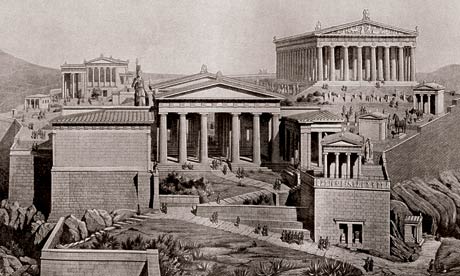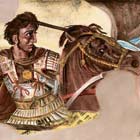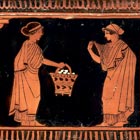
BFR92R The Acropolis, Athens, Greece as it would have appeared in ancient times. Photograph: Classic Image/Alamy
E pluribus unum: "out of many – one". The one-time motto of the US reminds us that, much like most of the larger nation states today, ancient Greece was a mosaic of very different components: about 1,000 of them at any one time between c600BC and AD330. That is, there were a thousand or so separate, often radically self-differentiated political entities, most of which went by the title of polis, or citizen-state. Our term "Greece" is derived from the Romans' Latin name, Graecia, whereas the ancient Greeks spoke of Hellas – meaning sometimes the Aegean Greek heartland, at other times the entire, hypertrophied Hellenic world – and referred to themselves as "Hellenes".
In the foundational epics attributed to Homer, however, you won't find Greeks referred to as "Hellenes" but as "Achaeans", "Danaans", or "Argives". That was because the epics are set in a period before "Hellas" and "Hellenes" had become common currency – before, that is, the eighth century BC, when Greeks first started emigrating permanently from the Aegean basin and settling around the Mediterranean and Black Seas. By the time of Plato, around 400BC, Hellas stretched from the Pillars of Heracles (straits of Gibraltar) in the west to Phasis in Colchis (in modern Georgia) in the far east. Later, following the conquests of Alexander the Great, the pale of Hellenic settlement was extended even further eastwards, as far as Afghanistan and the Indus Valley of Pakistan.
Everyone who was not a Hellene by birth, language or culture was labelled a barbaros. Originally an onomatopoeic description of anyone who spoke a non-Greek, unintelligible language, barbaros came to acquire the pejorative connotations of "barbarous" and "barbaric". The Romans took the same sort of view of all non-Romans – excepting only Hellenes – which is how those emotive terms entered our own language.
United Greece
 Alexander the Great fighting in the Battle of Issus, ca. 310 B.C., based on Roman Mosaic from the House of the Faun, Pompeii, Italy Photograph: © Bettmann/CORBIS
Alexander the Great fighting in the Battle of Issus, ca. 310 B.C., based on Roman Mosaic from the House of the Faun, Pompeii, Italy Photograph: © Bettmann/CORBIS The transformational turning point came in the first decades of the fifth century BC, in the course of the epic conflict known from the Greek standpoint as the Persian Wars. The mighty Persian empire, the fastest growing and largest oriental empire yet, had threatened to swallow up mainland Greece as well as those Greeks who lived within the bounds of what the Persians considered their own sphere – Asia. But on the battlefields of Marathon, Salamis, Plataea and Mycale, a relative handful of Greek communities managed to unite long enough to repulse that threat – for ever, as it turned out. Indeed, Alexander turned the tables by conquering the old Persian empire and starting to create a new Helleno-Persian successor: oriental in its underlying administrative and symbolic structure, but Greek in unifying language and high culture.
Furthermore, the Greeks' unexpected victories over the Persians of 490 and 480-479BC unleashed an era of unparalleled cultural creativity – from Aeschylus's tragic drama Persians of 472BC to the mathematical genius of Archimedes. However, united though they were by religion and common social customs and by at least partly fictional self-images, these Greeks were very much not united by one of their major contributions to the sum of human achievement – politics.
Much of our everyday political language is of ancient Greek derivation: monarchy, tyranny, oligarchy, aristocracy, plutocracy, democracy – not to mention the word "politics" itself. Much of the rest is Latin-derived: constitution, republic, empire, among others. But the Latin for "democracy" was democratia, a loan-word, because actually the Romans didn't do democracy – at least not in the original ancient Greek sense of the term; and they recognised, as we all do or should, that in this sphere the Greeks had been the original pioneers.
However, the ancient Greeks' demokratia was hugely different not just in scale but in kind from any modern political system that claims the title of "democracy". That was partly because the fundamental ancient Greek political unit, the polis, was a strong community in a very exclusive sense: only adult male citizens could consider themselves politically entitled. Even then, the ancient Greeks typically ruled themselves directly, in that they did not select rulers to rule over and for them. Theirs were direct, participatory self-governments, whereas ours are notionally "representative".
But democracy, so far from being the ancient Greek norm, was at first a rare and rather fragile plant: only later did it become about as widely distributed as various forms of oligarchy. And only in a few cases – in Athens, above all – was it both deeply rooted and conspicuously radical. At all times and in all places it remained more or less controversial. And there was a good linguistic reason for this. Demokratia was a compound of demos and kratos. But whereas kratos unambiguously meant "grip" or "power", demos could be interpreted to mean either "people" (in a vague sense, as in Abraham Lincoln's famous words at Gettysburg: "government of the people, by the people, for the people") or very specifically "the masses": the poor majority of the enfranchised citizen body (which might range in size from as few as 500, as on the island-state of Melos in the Cyclades, to as many as the 50,000 citizens of democratic Athens).
So if you liked demokratia, it could mean People Power, but if you hated it – if, say, you were a member of the wealthy elite – then it could stand for the ancient Greek equivalent of Lenin's dictatorship of the proletariat.
By and large the Romans took the second view, which is why they went to great lengths to stamp it out within their empire – the eastern half of which was basically Greek – in the end with total success. It therefore took a great deal of effort and ingenuity in the 19th century to rehabilitate "democracy" as a viably positive term of political discourse – and even then only at the cost of draining it of the active, participatory, class-conscious dimension the Athenians had given it.
Worship and sacrifice
A popular proverb says that the ancient Greeks "had a word for it". But actually they didn't always. A conspicuous example is that they had no word for our "religion", which is taken from Latin. Our manifold and multifarious legacy from the ancient Greeks does not include their polytheistic religion – which was superseded and suppressed by various forms of Judaeo-Christianity and then Islam. These latter faiths are all based on the presumption of a single deity, and on privileged hierarchies of vocational officials who interpret their sacred texts and dogmas. The ancient Greeks' "things of the gods", on the other hand, needed no clergy, dogma or doctrine: formulaic rituals mattered above all.
It is easy for us today to be over-impressed by the standing remains of monumental temples such as those on the Acropolis of Athens or of Greek Acragas (Agrigento in Sicily), or by reports of now lost wonders such as the huge seated cult-statue of Zeus at Olympia, crafted by master sculptor Pheidias of Athens in the 430sBC. For most Greeks the object of their greatest devotion was an altar, whether domestic or public. The most characteristic act of religious worship was the performance of a sacrifice, such as a gift of olive oil, wine or grain, or the killing of a pig or chicken. These offerings symbolised both communion between the god or goddess and their mortal worshippers, as well as the unbridgeable gulf that separated the human from the super-human. Though the Greeks' gods and goddesses were represented in human shape, they were regarded rather as powers – immeasurably more powerful than puny mortals.
Myths
Another unique feature about the Greek deities was that they didn't have a hand in creating the world. In fact, they themselves were created only after a void state of chaos. We refer to these stories about the Greek gods' supernatural origins and functions as "myths". But for the Greeks a myth was a traditional tale that could have a purely secular, mortal content. Indeed, it was a prime marker of advanced intellectuals' sceptical, rational, critical outlook that "myth" came to be downgraded as a derogatory term meaning something like a romantic fiction. And it was a condition of the Greeks' achievements in philosophy and the natural sciences that they managed to reason without invoking mythology, conducting their ideas on the understanding that the natural and human worlds could in principle be explained without recourse to the hypothesis of supernatural intervention.
The Greek world's first paid-up intellectual was Thales of Miletus (on the Aegean seaboard of western Turkey today), who lived around 600BC. He not only fell down wells while contemplating the heavens (as all proper intellectuals should), but also predicted a total solar eclipse (here he was fortunate to be heir to the discoveries and records of Babylonians and Egyptians before him), thus robbing it of potential divine mystique, and once made a substantial profit by successfully predicting a bumper olive harvest. Thales and his followers had a particular interest in the kosmos: a non-human universe that was hypothetically ordered and orderly. The way to study it was through historia: empirical enquiry or research.
Science
The results they came up with were hardly what we would call scientific. That was left for the doctors of the school of medicine, founded by Hippocrates in the fifth century BC on the east Aegean island of Kos; and the astronomers attached to the museum and library of Alexandria in Egypt in the third century BC. The latter spawned intellectual giants such as Eratosthenes from Cyrene in today's Libya, who successfully measured the Earth's circumference to within a small margin of error.
Despite these giant steps, it is important to remember that most ordinary Greeks were not persuaded to adopt a rationalist, non-theistic world outlook, nor were they always tolerant of the eccentric intellectuals they harboured in their midst – especially not at times of great societal crisis such as the Peloponnesian War (431–404BC). A case in point was the trial and execution of Socrates at Athens, by a democratic jury of 501 mostly "ordinary" Athenian citizens, in 399BC.
Socrates was convicted of "introducing brand-new, publicly unrecognised divinities" without the Athenian people's say-so, and of "corrupting the young". Both charges carried particular weight in the fraught circumstances of 399BC: this was just a few years after the Athenians' total defeat in the Peloponnesian war by Sparta, an enemy that prided itself on its conservative traditionalism in all matters concerning the gods. That its oligarchic junta had done to death many hundreds of ordinary Athenians was still fresh in the memory. The trial of Socrates and its outcome should remind us that democratic Athens, despite being a relatively open society, was no liberal paradise of principled religious tolerance.
Economics
Socrates is the main participant in a fictional dialogue composed by the versatile Athenian historian Xenophon (c428-355BC), entitled (in Latin transliteration) Oeconomicus. Yet "economics" in our sense is not what the discourse is about, but rather the management of an oikos or "household".
The Greeks "did" economics, practically speaking, but they did not theorise it as we do. This was partly because they did not develop a suitable macro-economic technical vocabulary but also because, like their politics and religion, their economic realities were very different from those of a capitalist, let alone a globalised, economy. Most Greeks lived on and from the land. This is not to deny that local, regional and international trading networks could be crucially important, not least when the commodity being traded was a life-giving staple such as grain. But as much as 80% of the typical population of a typical polis were employed in peasant-style, non-market-oriented agriculture, working to satisfy needs rather than maximise profit.
Women and slaves
 Detail from a pyxis showing a scene from the women's quarter, c450BC Photograph: British Musuem
Detail from a pyxis showing a scene from the women's quarter, c450BC Photograph: British Musuem Women, whose public valuation by men was often distressingly low, were economically crucial within the household, where they processed food, produced children and clothing, and managed the free or unfree workforce.
The modern Greek term for housewife, noikokyra ("lady of the household") had its ancient counterpart, especially in Sparta, where women vied not just to control but to own more than one household property. Elsewhere in Greece, women's property rights were severely limited. Indeed, it wouldn't have been uncommon for a wealthy Greek house-lord to think of his womenfolk as little better than the chattel slaves he owned. Ordinary Greeks, of course, might not have had the luxury of owning even a single slave, greatly desirable though that was thought to be.
Most slaves were individually and privately owned, having been bought on the market as commodities. But some slaves – such as the gaolers of Socrates – were public servants. At Athens, there was an exceptional concentration of slave worker personnel in the state-owned silver mines, who were economically vital: the product of their labours paid for Athens' navy and a wide variety of other public and political services.
In Sparta they managed their servile system very differently. Although there were some chattel-type (privately owned) slaves, the dominant form of servitude here was a kind of collective serfdom, known as helotage. And whereas most chattel slaves were dispossessed, non-Greek foreigners, the Helots were born into inherited bondage: this, perhaps, a final reminder of just how alien ancient Greece can be, for all its status as one of the fountainheads of western civilisation.
Paul Cartledge is AG Leventis Professor of Greek culture at Cambridge University and the author of several books, most recently Ancient Greece: A History in Eleven Cities (Oxford University Press)

 BFR92R The Acropolis, Athens, Greece as it would have appeared in ancient times. Photograph: Classic Image/Alamy
BFR92R The Acropolis, Athens, Greece as it would have appeared in ancient times. Photograph: Classic Image/Alamy 















